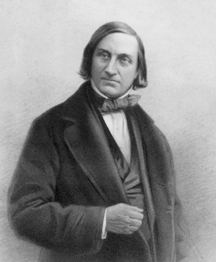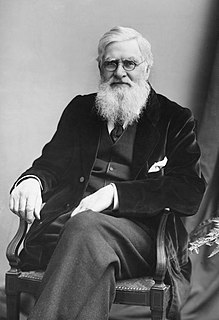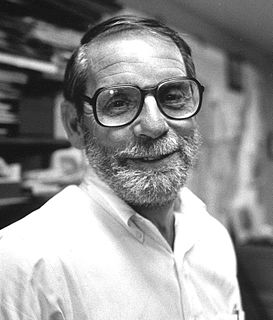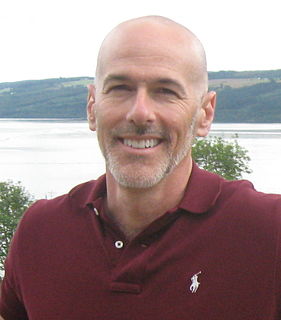A Quote by Edward Forbes
Moreover, all our knowledge of organic remains teaches us, that species have a definite existence, and a centralization in geological time as well as in geographical space, and that no species is repeated in time.
Related Quotes
Palaeontological research exhibits, beyond question, the phenomenon of provinces in time, as well as provinces in space. Moreover, all our knowledge of organic remains teaches us, that species have a definite existence, and a centralization in geological time as well as in geographical space, and that no species is repeated in time.
On the geological time scale, a human lifetime is reduced to a brevity that is too inhibiting to think about deep time. ... Geologists ... see the unbelievable swiftness with which one evolving species on the Earth has learned to reach into the dirt of some tropical island and fling 747s across the sky ... Seeing a race unaware of its own instantaneousness in time, they can reel off all the species that have come and gone, with emphasis on those that have specialized themselves to death.
Clearly, we are a species that is well connected to other species. Whether or not we evolve from them, we are certainly very closely related to them. A series of mutations could change us into all kinds of intermediate species. Whether or not those intermediate species are provably in the past, they could easily be in our future.
Despite the campaign rhetoric, the bureaucracies-big business and big government-are here to stay. The centralization effort cannot be checked. but it can be rationally directed towards our species goal: Space Migration, which in turn offers the only way to re-attain individual freedom of space-time and the small-group social structures which obviously best suit our nervous systems. It is another paradox of neuro-genetics that only in space habitats can humanity return to the village life and pastoral style for which we all long.
Perhaps walking is best imagined as an 'indicator species,' to use an ecologist's term. An indicator species signifies the health of an ecosystem, and its endangerment or diminishment can be an early warning sign of systemic trouble. Walking is an indicator species for various kinds of freedom and pleasures: free time, free and alluring space, and unhindered bodies.
Researchers keep identifying new species, but they have no idea about the life cycle of a given species or its other hosts. They cut open an animal and find a new species. Where did it come from? What effect does it have on its host? What is its next host? They don't know and they don't have time to find out, because there are too many other species waiting to be discovered and described.
I am a member of a fragile species, still new to the earth, the youngest creatures of any scale, here only a few moments as evolutionary time is measured, a juvenile species, a child of a species. We are only tentatively set in place, error prone, at risk of fumbling, in real danger at the moment of leaving behind only a thin layer of of our fossils, radioactive at that.
When I am at a dinner table, I love to ask everybody, 'How long do you think our species might last?' I've read that the average age of a species, of any species, is about two million years. Is it possible we can have an average life span as a species? And do you picture us two million years more or a million and a half years, or 5,000?
We see ourselves in other people’s eyes. It’s the nature of the human race; we are a species of reflection, hungry for it in every facet of our existence. Maybe that’s why vampires seem so monstrous to us—they cast no reflection. Parents, if they’re good ones, reflect the wonder of our existence and the success we can become. Friends, well chosen, show us pretty pictures of ourselves, and encourage us to grow into them. The Beast shows us the very worst in ourselves and makes us know it’s true .
There are millions of different species of animals and plants on earth--possibly as many as forty million. But somewhere between five and fifty BILLION species have existed at one time or another. Thus, only about one in a thousand species is still alive--a truly lousy survival record: 99.9 percent failure!
The ordinary naturalist is not sufficiently aware that when dogmatizing on what species are, he is grappling with the whole question of the organic world & its connection with the time past & with Man; that it involves the question of Man & his relation to the brutes, of instinct, intelligence & reason, of Creation, transmutation & progressive improvement or development. Each set of geological questions & of ethnological & zool. & botan. are parts of the great problem which is always assuming a new aspect.
The library connects us with the insight and knowledge, painfully extracted from Nature, of the greatest minds that ever were, with the best teachers, drawn from the entire planet and from all our history, to instruct us without tiring, and to inspire us to make our own contribution to the collective knowledge of the human species.
Human beings are not inevitable, and our brief existence is not preordained to be extended into the distant future. If Homo sapiens is to have a continued presence on earth, humankind will reevaluate its sense of place in the world and modify its strong species-centric stewardship of the planet. Our collective concepts of morality and ethics have a direct impact on our species' ultimate fate.



































